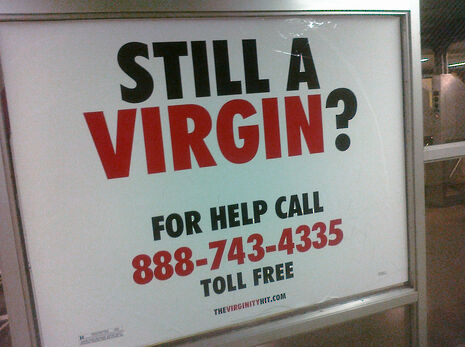Cambridge needs to lose its virginity
Rebecca Maggs on the V-word in Cambridge

Virginity. Sex. It’s something we as a society obsess over. “When did they lose their virginity?”, “I’m saving my virginity for someone special”, or “They’ve slept with so many people” are all phrases we think and hear a lot.
Of course, now we come to it; what is virginity? Most people would view it as penis penetrating the vagina. Plain and simple. Boom. Cherry popped. Done. Sex is construed as the same thing (and this is how it will be defined here). Never mind oral sex, anal sex or anything else we define as sex or sexual experiences. But sex is a subjective term, and virginity should be too.
This is precisely the point: our conception of virginity is purely a social construct. Hopefully we’re all aware of how it’s developed over centuries when expectations of marriage were entirely different. Then, virginity was essentially a form of paternity testing for safeguarding legitimate bloodline property transfer. Hence the association of virginity with purity and innocence was idealised, bolstered by religion. With it came the stigmatisation of female sexuality (especially non-marital sex) as dirty, sluttish, and shameful.
But we don’t live in this kind of society anymore, right? It’s normal (or at least accepted) that unmarried people have sexual relationships and flings. Don’t get me wrong, the point here is not to devalue how special and exclusive all acts of physical intimacy often are. But why is losing your virginity still such a big thing as opposed to giving oral sex? Why does ‘sleeping around’ make a man cool and a woman a slut? Our ideas about virginity have not morphed correspondingly to societal norms. So the way we think about sex is somewhat irrelevant. Virginity in the modern day is a huge topic, but there were some specific things I wanted to pull out:
1) Virginity, Sexism and Sluts: Prejudices around virginity embody sexual double standards. Society has internalised the idea that virginity is a commodity women have to be careful not to lose at the wrong time, with the wrong person and for the wrong reasons. In other words, virginity frames a woman’s worth as inversely proportional to how much and what kind of sex she’s had. The more sex a woman has had, the less pure she is, and therefore the less ‘valuable’ she is. This sounds ridiculous – until you realise that we pat men on the back for ‘getting laid’ while we slut-shame women, dealing out guilt, judgment and subordination for their sexuality. How many times have we heard of a promiscuous girl and immediately thought “what a slut” before realising that we do not think of men in the same way? Female sexuality is still internalised as something disgusting and impure, and slut-shaming reinforces this puritanical mindset. Men don’t entirely get off scot-free here either, though. The pressure of avoiding being a 40 year-old virgin is enormous, and having lots of sex is synonymous with masculinity.
2) You Can’t Mistake My Biology: Virginity is lost when the hymen is broken by penetration, right? (Note how irrelevant this definition is for men). Wrong. There is no biological marker for virginity – most hymens wear away shortly before or during adolescence. So if a hymen was an indication of virginity, most women are not virgins before they even become sexually active.
3) ‘Virginity’ is exclusive: This is another reason ‘virginity’ needs overhauling. Of course we don’t think of same-sex couples as lifelong virgins, despite their purely technical inability to have penetrative vaginal sex. But the language of virginity has not adapted to this, devaluing their romantic and sexual experiences.
So how should we think about virginity? The language of shame needs to change immediately. ‘Slut’ is a disgusting word that serves no purpose except to vilify female sexuality, and frameworks of ‘loss’ and ‘broken’ imply virginity is an idealised state to be lamented once gone. Furthermore, the construction of the language of sex and virginity narrows it down to a technicality that not only ignores and devalues many people, but also ignores and devalues any other type of sexual experience, which can be equally valid and intimate. These attitudes belong to an age with different socio-sexual norms, and don’t have any place in our society now.
So is ‘virginity’ a helpful construct to define how we sexually interact in the 21st century? No, not really. Perhaps it’s more socially relevant now to consider other forms of intimacy equally valid. If you’re going to have oral sex, can you really still call yourself a virginal innocent? Why can’t a woman, now armed with contraception and independence, enjoy and express herself through frequent sex too? Is ‘innocence’ still a helpful or relevant way to think about sex, given the exposure to physical intimacy through magazines, TV, clothing and social media?
We should not be thinking in terms of ‘losing virginity,’ but rather ‘becoming sexually active’ (i.e. engaging in physical intimacy). Yes, this is very ambiguous, but then intimacy is not homogenous in people’s experiences, desires or meanings. The attempt to put sex into a box in the form of ‘virginity’ imbues it with the language of exclusion. I am not attempting to advocate a sexual free-for-all just because we can, and obviously choice, consent and romantic intimacy are all integral in how we conduct ourselves sexually. But sex and sexualities are something to be celebrated and embraced, and the language of ‘virginity’ screams of negativity. We need a much more positive construction of sex and intimacy. It’s time society lost its virginity.
 Comment / The (Dys)functions of student politics at Cambridge19 January 2026
Comment / The (Dys)functions of student politics at Cambridge19 January 2026 News / Local business in trademark battle with Uni over use of ‘Cambridge’17 January 2026
News / Local business in trademark battle with Uni over use of ‘Cambridge’17 January 2026 News / Your Party protesters rally against US action in Venezuela19 January 2026
News / Your Party protesters rally against US action in Venezuela19 January 2026 Features / Exploring Cambridge’s past, present, and future18 January 2026
Features / Exploring Cambridge’s past, present, and future18 January 2026 News / Cambridge bus strikes continue into new year16 January 2026
News / Cambridge bus strikes continue into new year16 January 2026







